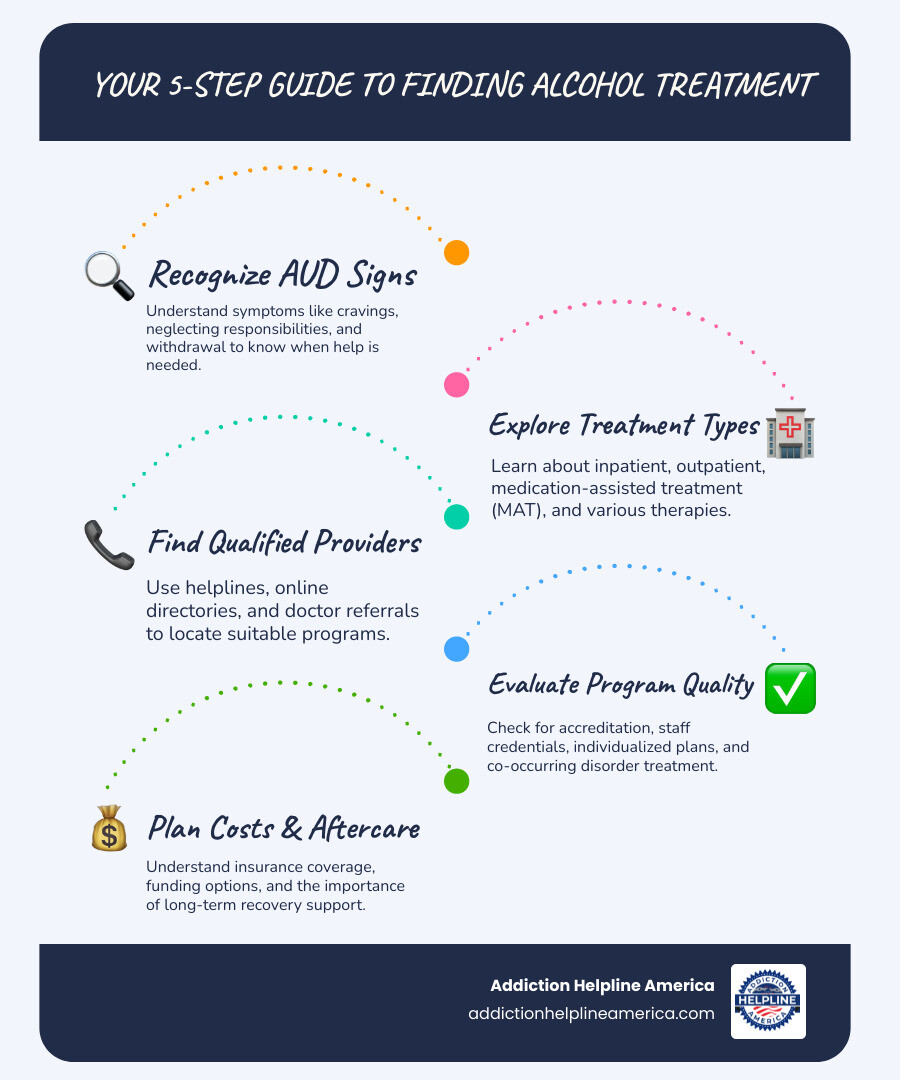
Why Finding the Right Help Matters When You’re Ready to Stop Drinking
To find alcohol treatment, you can start by calling a 24/7 helpline like 1-800-662-HELP (4357) or using an online directory like FindTreatment.gov. You can also ask your family doctor for a referral or contact organizations like SAMHSA or NIAAA for guidance. Treatment options include inpatient rehab, outpatient programs, therapy, medication, and support groups like AA.
Alcohol Use Disorder (AUD) is a medical condition that affects millions of people. The good news is that today there are more effective options available for treating AUD than ever before. If you or someone you love is struggling with alcohol, you’re not alone—and you don’t have to figure this out by yourself. The path to recovery starts with finding quality treatment that fits your unique situation.
This guide breaks down how to find the right alcohol treatment in five straightforward steps. You’ll learn how to recognize when help is needed, explore different types of treatment, locate qualified providers, evaluate program quality, and plan for costs and aftercare.
At Addiction Helpline America, we’ve helped countless individuals and families find alcohol treatment that works for their specific needs through our 24/7 confidential helpline and treatment locator services. Our team of experienced addiction specialists is here to guide you through this first step with compassion and expertise.
Easy find alcohol treatment glossary:
Step 1: Recognize the Signs and Symptoms of AUD
Before you can find alcohol treatment, it’s important to understand what you’re dealing with. Alcohol Use Disorder (AUD) isn’t a character flaw or a lack of willpower—it’s a treatable medical condition. The DSM-5, a manual used by doctors, lists 11 criteria for AUD. Meeting just two of these within a year may indicate AUD.
Common signs of AUD in daily life include:
- Difficulty controlling drinking: Planning to have one or two drinks but consistently having more.
- Cravings: A persistent and overwhelming urge to drink.
- Neglecting responsibilities: Alcohol use begins to interfere with work, family, or personal obligations.
- Tolerance: Needing more alcohol to achieve the same effect.
- Withdrawal symptoms: Experiencing physical and psychological distress when you try to stop or cut back.
If these signs sound familiar, it’s time to consider getting help. Deciding to change is a courageous first step, and early intervention often leads to better outcomes.
If you’re in immediate crisis or having thoughts of suicide, please reach out right now. The 988 Suicide & Crisis Lifeline provides free, confidential support 24/7.
Understanding Alcohol Withdrawal
Many people don’t realize that alcohol withdrawal can be dangerous and even life-threatening. When you drink heavily over time, your brain chemistry adapts, creating a physical dependence. Suddenly stopping can send your brain into overdrive.
This is why detoxing alone is so risky. Common withdrawal symptoms include anxiety, trembling, nausea, and sweating. However, more severe complications like seizures and Delirium Tremens (DTs) can be fatal. DTs involve severe confusion, hallucinations, and dangerous spikes in heart rate and blood pressure.
Medically-supervised detox is the safest way to begin recovery. Healthcare professionals monitor you around the clock, providing medications to ease symptoms and prevent complications, ensuring you are safe and as comfortable as possible.
Taking the First Step
Acknowledging you have a problem is difficult. Your mind might create excuses, which is a normal part of denial. However, the moment you start questioning your relationship with alcohol, you’ve already begun the journey. You don’t need to hit “rock bottom” to deserve help.
The importance of early intervention can’t be overstated. Treatment is most effective when matched to your specific needs. Speaking to a doctor or therapist is an excellent first step. They can assess your health, explain your options without judgment, and connect you with addiction specialists who can guide you toward the right level of care.
Step 2: Explore the Different Types of Alcohol Treatment
There’s no single “best” way to find alcohol treatment that works for everyone. The key is finding personalized, evidence-based care that matches your specific situation. Treatment exists on a “continuum of care,” meaning there are different levels of support available, from intensive programs to more flexible options.
Inpatient vs. Outpatient Treatment
Understanding the two main categories of treatment—inpatient and outpatient—can help you find a program that fits your life.
Inpatient rehab (or residential treatment) means you live at the facility, receiving 24/7 medical supervision and structured therapy. This immersive environment removes you from daily stressors and triggers. It’s typically recommended for severe AUD, co-occurring health conditions, or if your home environment isn’t supportive of recovery. Programs often last 30, 60, or 90 days.
Outpatient programs allow you to live at home while attending treatment sessions. This flexibility is ideal if you need to maintain work or family commitments. The intensity varies:
- Partial Hospitalization Programs (PHP) are the most intensive, often meeting 5 days a week for several hours.
- Intensive Outpatient Programs (IOP) involve several hours of therapy on multiple days per week.
- Standard outpatient programs have fewer weekly sessions and are suitable for milder AUD or as a step-down from more intensive care.
A professional assessment can help determine which level of care is right for you.
The Role of Medication in Treatment
Medication-Assisted Treatment (MAT) combines FDA-approved medications with counseling to treat the whole person. MAT is proven to improve outcomes, reduce cravings, and help prevent relapse.
Three common medications for AUD are:
- Naltrexone: Reduces the pleasurable effects of alcohol, which can help decrease heavy drinking.
- Acamprosate: Helps restore brain chemistry balance, reducing the physical and emotional discomfort of early recovery.
- Disulfiram: Creates an unpleasant physical reaction if you drink alcohol, acting as a deterrent.
These medications are prescribed by a doctor and are most effective when used as part of a comprehensive treatment plan that includes therapy.
Therapeutic Approaches and Support Groups
Therapy addresses the psychological, emotional, and social factors behind alcohol use.
- Cognitive Behavioral Therapy (CBT) helps you identify and change negative thought patterns and behaviors related to drinking.
- Dialectical Behavior Therapy (DBT) teaches skills for managing intense emotions and is helpful for co-occurring mental health issues.
- Individual, group, and family therapy provide different settings to explore underlying issues, build a support community, and heal relationships.
- Peer support connects you with others in recovery. Alcoholics Anonymous (AA) is a well-known 12-Step program. Have a problem with alcohol? There is a solution. Other groups like SMART Recovery offer alternative, evidence-based approaches. The most effective treatment programs often combine professional therapy with robust peer support.
Step 3: How to Find Alcohol Treatment Providers
Once you know what to look for, the next step is finding the right provider. Fortunately, there are trusted resources designed to help you find alcohol treatment that matches your needs.
Where to find alcohol treatment resources in the United States
If you’re in the United States, several excellent starting points are available.
At Addiction Helpline America, we operate a 24/7 free and confidential helpline to help people find alcohol treatment. Our specialists can verify your insurance, explain program types, and connect you with centers in our nationwide network that fit your needs.
Other trusted resources include:
- SAMHSA National Helpline: Call 1-800-662-HELP (4357) for free, confidential treatment referrals and information, available 24/7 in English and Spanish. National Helpline
- 988 Suicide & Crisis Lifeline: For immediate support in a crisis, call or text 988 anytime. 988 Suicide & Crisis Lifeline
- FindTreatment.gov: This confidential and anonymous online directory from SAMHSA allows you to search for facilities by location, services, payment options, and more. Behavioral Health Treatment Services Locator
- NIAAA Alcohol Treatment Navigator: This unbiased, government-run tool helps you understand what to look for in quality, evidence-based treatment. NIAAA Alcohol Treatment Navigator
- State Health Departments: Most states maintain their own directories of licensed addiction treatment providers, including publicly funded options.
- Primary Care Doctor: Your doctor can be an invaluable ally, providing referrals to trusted local programs and specialists.
You don’t have to steer this process alone. These resources are staffed by trained professionals ready to guide you toward the help you deserve.
Step 4: Evaluate a Program’s Quality and Fit
After identifying potential programs, you need to determine if they offer quality care and are a good fit for you. Not all treatment centers are created equal, and taking the time to vet your options can make a significant difference in your recovery.
What to Look For in a Quality Program
Look for these key indicators of a high-quality treatment program:
- Accreditation and Licensing: The facility should be licensed by the state and accredited by a recognized body like The Joint Commission or CARF. This proves they meet national standards of care.
- Qualified Staff: The team should include licensed medical doctors, therapists, and certified addiction counselors with experience in treating AUD.
- Evidence-Based Methods: The program should use therapies proven by research, such as Cognitive Behavioral Therapy (CBT) and Dialectical Behavior Therapy (DBT).
- Individualized Treatment Plans: Quality programs conduct a thorough assessment and create a personalized treatment plan custom to your specific needs and goals.
- Co-occurring Disorder Treatment: Since about half of people with AUD also have a mental health condition (like depression or anxiety), the best programs treat both simultaneously.
- Aftercare Planning: A good program helps you plan for life after treatment, providing resources for relapse prevention and long-term support.
Key questions to ask when you find alcohol treatment
When speaking with providers, be prepared to ask questions. You are hiring them for a critical job. Here are some essential questions to ask:
- What is your treatment philosophy?
- What specific, evidence-based therapies do you use?
- Do you treat co-occurring mental health disorders?
- What are the qualifications and credentials of your staff?
- How long does the program last, and what does a typical day look like?
- Do you offer medical detox on-site?
- Can a doctor on staff manage my other medical conditions or prescribe addiction medications?
- How is family involved in the treatment process?
- What aftercare support and relapse prevention planning do you offer?
- What are the costs, and what insurance or payment options are available?
At Addiction Helpline America, our team can help you ask these questions and find a program that meets these quality standards.
Step 5: Plan for Costs, Insurance, and Aftercare
Financial concerns are valid, but they shouldn’t prevent you from getting help. With planning, quality treatment is often more accessible than you might think. Just as important as getting into treatment is planning for what comes after, as recovery is a long-term journey.
Understanding Costs and Insurance Coverage
Treatment costs vary widely based on the type of program, location, and duration. Here’s how to manage the financial side:
- Verify Your Insurance: Call your insurance provider to understand your benefits for substance abuse treatment. Ask about your deductible, co-pays, and out-of-pocket maximum. At Addiction Helpline America, we can help you with this step, verifying your benefits quickly and confidentially.
- In-Network vs. Out-of-Network: In-network facilities have pre-negotiated rates with your insurer, making them more affordable. Out-of-network providers will cost more out-of-pocket.
- Other Payment Options: If you don’t have insurance, many centers offer private pay plans with financing. State-funded programs offer free or low-cost treatment for eligible residents. Some facilities also use a sliding scale fee based on your income.
- Affordable Care Act (ACA): The ACA classifies mental health and substance use disorder services as essential health benefits, meaning most insurance plans must provide coverage.
The most expensive program isn’t always the best. The goal is to find quality care that fits your clinical needs and your budget.
How Long Treatment Lasts and What Aftercare Involves
The duration of treatment depends on your individual needs. Detox may take 3-7 days, but it’s only the first step. Residential rehab programs often run for 30, 60, or 90 days. Outpatient programs can vary in length.
Leaving a program isn’t the finish line. Aftercare is the ongoing support system that helps you maintain sobriety. Key components include:
- Sober Living Homes: These provide a structured, supportive environment as you transition back to daily life.
- Alumni Programs: Many centers offer programs to keep you connected to a supportive recovery community.
- Ongoing Therapy: Continuing with individual or group counseling helps you steer challenges and reinforce coping skills.
- Support Groups: Meetings like Alcoholics Anonymous (AA), SMART Recovery, or LifeRing offer free, ongoing peer support.
- Relapse Prevention Plan: Your treatment team will help you create a personalized plan to identify triggers and develop healthy coping strategies.
Planning for aftercare is essential for building a sustainable, long-term recovery.
How to Support a Loved One Seeking Treatment
Watching a loved one struggle with Alcohol Use Disorder is heartbreaking. Your support can be a crucial factor in their recovery, but it’s important to distinguish between helping and enabling.
Enabling means protecting someone from the consequences of their drinking, such as making excuses for them or giving them money for alcohol. While well-intentioned, this can prevent them from recognizing their need for help.
Instead, focus on setting healthy boundaries. This means calmly and consistently deciding what behaviors you will and won’t accept. For example, you might say, “I love you, but I can’t lend you money. I am happy to help you find alcohol treatment.” Boundaries protect your well-being and create an opportunity for your loved one to face their reality.
When you talk to them, choose a time when they are sober. Speak from a place of concern, using “I” statements like, “I’m worried about you,” rather than accusations. Let them know that seeking help is a sign of strength.
Remember to care for yourself, too. You don’t have to go through this alone. Groups like Al-Anon and Alateen are designed for families and friends of people with alcohol problems. They provide a safe space to share experiences and learn coping strategies. Many treatment programs also offer family therapy to help heal relationships and build a supportive home environment for recovery.
Frequently Asked Questions about Finding Alcohol Treatment
Is my search for alcohol treatment confidential?
Yes, your search is confidential. Helplines and online directories like FindTreatment.gov are designed to be secure and anonymous. Once you contact a healthcare provider, your information is protected by strict privacy laws like HIPAA (Health Insurance Portability and Accountability Act) in the United States.
At Addiction Helpline America, we are committed to maintaining your privacy and discretion throughout the entire process. You can reach out for help with confidence.
What is the difference between detox and rehab?
Detox and rehab are two distinct but essential stages of recovery.
Detox (withdrawal management) is the process of safely clearing alcohol from your body under medical supervision. Because alcohol withdrawal can be dangerous, medical oversight is crucial to manage symptoms and prevent serious complications like seizures. Detox addresses the physical dependence on alcohol and typically lasts a few days to a week. It is the necessary first step before treatment can begin.
Rehab (rehabilitation) is the comprehensive program that follows detox. It involves therapy, counseling, and education to address the psychological, emotional, and behavioral aspects of addiction. In rehab, you learn coping skills and relapse prevention strategies to build a foundation for long-term sobriety. Rehab can be inpatient or outpatient and lasts from 30 days to several months.
In short, detox gets the alcohol out of your system, while rehab teaches you how to live without it.
How do I know if I need inpatient or outpatient treatment?
A professional assessment by an addiction specialist is the best way to determine the right level of care for you. They will consider several factors:
- Severity of AUD: Individuals with a long history of heavy drinking or multiple relapse attempts often benefit from the structure of inpatient treatment.
- Co-occurring Disorders: If you have serious medical or mental health issues (like severe depression, PTSD, or bipolar disorder), the 24/7 medical and psychiatric support of an inpatient setting is generally safer and more effective.
- Home Environment: If your living situation is unstable or includes triggers, inpatient treatment provides a safe, sober environment. If you have a strong, supportive home life, outpatient treatment may be a viable option.
- Previous Treatment History: If you have not succeeded with outpatient treatment in the past, a higher level of care like an inpatient program may be recommended.
An addiction specialist can evaluate these factors to guide you toward the treatment path that gives you the best chance for a successful recovery.
Your Path to Recovery Starts Today
You’ve taken an important step by learning how to find alcohol treatment. This process is about choosing hope and taking meaningful action toward a healthier, more fulfilling life. Recovery is a journey, not a destination, and millions of people are walking this path right now.
Help is available, and you don’t have to face this challenge alone. Whether you’re just starting to explore options or are ready to commit to a program, the resources you need are within reach.
At Addiction Helpline America, our mission is to ensure everyone has access to quality treatment. We provide free, confidential support to help you steer these steps and find a program that fits your unique situation. Our specialists understand that reaching out takes courage, and we’re here to walk beside you.
You don’t need to have all the answers. You just need to take the first step. One phone call can open the door to a different future.
Take the first step toward a brighter future.
Our helpline is 100%
free & confidential
If you or someone you care about is struggling with drug or alcohol addiction, we can help you explore your recovery options. Don’t face this challenge alone—seek support from us.
Programs
Call Our 24/7 Free & Confidential Alcohol Support Helpline
Will my insurance
cover addiction
treatment?
We're ready to help
Find the best
drug or alcohol treatment
center
Are you or a loved one struggling with addiction? Call today to speak to a treatment expert.
















